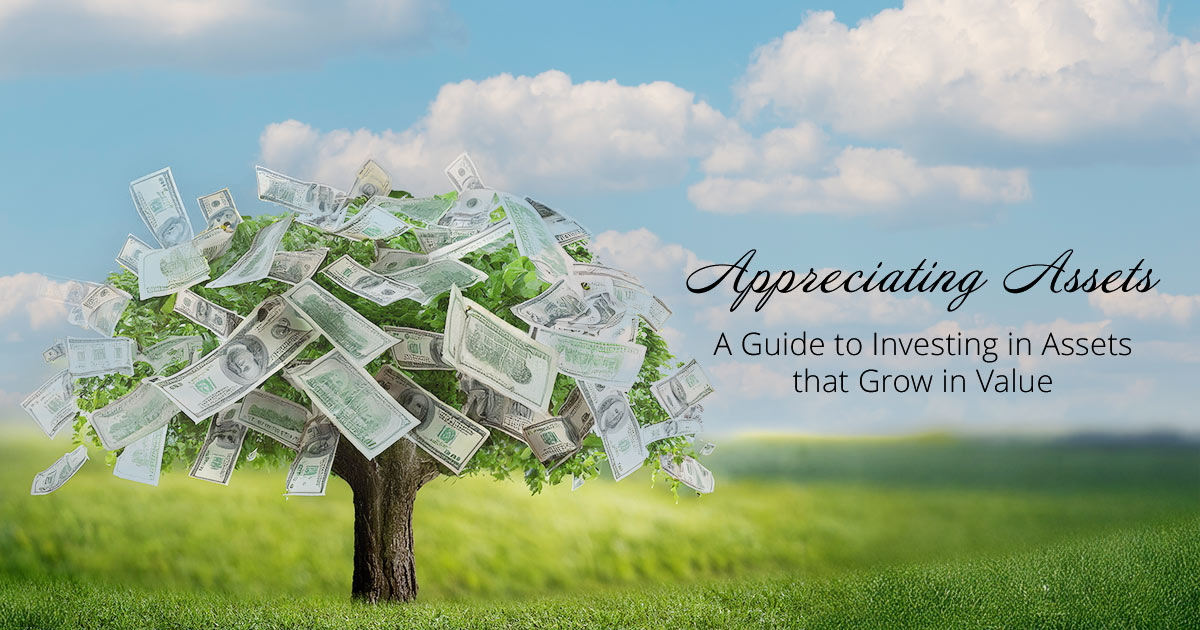Appreciating Assets: A Guide to Investing in Assets that Grow in Value

The main goal of investing is simple—making your money grow over time. Whether you’re planning for retirement, aiming for financial independence, or building wealth for future generations, this rule stays the same. According to a study by Credit Suisse, the average return on real investments, after adjusting for inflation, has been about 5.2% per year over the last 120 years. This shows how smart investments can beat inflation and help build wealth steadily.
But before you begin investing, there’s one big question you need to answer—where should you put your money? The answer can be tricky. Different investments come with different risks, growth potentials, and timeframes. Choosing the right option is key to seeing steady gains and avoiding losses.
Owning Assets: The Cornerstone of Wealth Creation
Owning assets is one of the best ways to grow your money. They can help you build wealth, earn income, and increase value over time. However, not all assets grow in the same way. Some, like cars or electronics, lose value as they age or get used. These are called depreciating assets. It’s important to understand the difference between these and assets that grow in value.
Appreciating assets are investments that become more valuable over time. Appreciation, in simple terms, means an increase in an asset’s worth. This can happen due to things like high demand, limited supply, or economic growth. For example, a house may become worth more as the neighborhood develops. Unlike items that lose value as they wear out, appreciating assets can help you grow your wealth. Knowing which assets grow and why is key to making smart investment choices.
Appreciating Assets You Should Consider Investing in
1. Real Estate
Real estate is a reliable investment that tends to grow in value over time. Whether it’s houses, apartments, office spaces, or land, their worth usually increases as areas develop. For instance, a home in a rapidly growing neighborhood with new schools or shopping centers can become much more valuable in a few years. Plus, rental properties can provide ongoing income while also appreciating.
2. Stocks
Stocks are shares of a company, and their value grows as the company becomes more successful. Over the long term, the stock market has shown solid growth, often around 7–10% annually. Companies like Apple or Microsoft are great examples of stocks that have risen significantly in value, making stocks a key tool for building wealth.
3. ETFs (Exchange-Traded Funds)
ETFs bundle together different investments like stocks or bonds, letting you invest in many at once. They are less risky than buying a single stock and tend to grow as the overall market improves. ETFs are a good choice to benefit from industries like technology or healthcare, which show steady growth over time.
4. Commodities
Gold, silver, and oil are examples of commodities that appreciate because of their limited supply and constant demand. Gold is especially popular during tough financial times and has steadily increased in value for decades. Even crops and resources like crude oil tend to rise in value with global demand.
5. Art and Collectibles
Paintings, rare coins, and other collectibles can become highly valuable over time. For example, a piece of art might dramatically increase in worth if the artist gains fame. While these items can appreciate greatly, their value can also fluctuate, so they require careful research.
6. Private Equity
Private equity allows you to invest in companies that aren’t publicly listed. This could be startups or growing businesses. While it’s a high-risk option, it can also offer very high returns if the company succeeds.
7. Bonds
Bonds are essentially a loan you give to a government or corporation in exchange for regular interest payments. At the end of the bond’s term, you get your full investment back. Bonds are a stable and low-risk way to grow your money steadily.
8. REITs (Real Estate Investment Trusts)
If managing property isn’t for you, REITs are an alternative. These allow you to invest in real estate indirectly by purchasing shares in companies that own or manage properties. They provide a steady income from rent while their value grows alongside the real estate market.
9. Certificates of Deposit (CDs)
CDs are simple investment options offered by banks. You agree to lock up your money for a set period and, in return, earn a higher interest rate than regular savings accounts. While they don’t grow as quickly as stocks or real estate, they’re extremely safe.
10. Cryptocurrencies (High Risk)
Cryptocurrencies like Bitcoin or Ethereum are newer investments with strong potential but high risk. Their value can rise quickly due to market interest and adoption, but they are also very volatile. It’s best to approach these with caution and keep them as a smaller part of your portfolio.
How to Take Care of Your Appreciating Assets
Looking after and managing appreciating assets is key to making sure they grow in value. Start by keeping up with market trends, as changes in the economy, local areas, or industries can affect your investments.
Spread your money across different types of assets, like real estate, stocks, and bonds, to lower risk and keep steady returns, even if one type performs poorly. Check on your investments regularly to see what’s doing well and what might need adjusting. Be ready to make changes, like selling underperforming assets, reinvesting profits, or trying out new opportunities.
For physical assets like property or antiques, good upkeep and improvements can help them keep or increase their value. Also, try using the income you earn from your investments—like rent or dividends—on new appreciating assets to grow your wealth even more. For a better financial future, you can preserve and increase the value of your investments by remaining knowledgeable, adaptable, and paying regular attention.
